Money, Money, Money! On Saturday March 9, 2019, Alpha Kappa Alpha Sorority, Inc., Delta Alpha Omega Chapter will host its First Annual Building Your Economic Legacy Conference. Ten workshops will be offered centered on building your wealth. Participants will be able to select from workshops including topics such as:
- Financial Planning
- Credit Building and Repair
- Home Ownership
- Health Care and Senior Planning
- Building your own business and brand
Dynamic presenters are prepared to provide information and answer any questions attendees may have.
The conference is Delta Alpha Omega chapter’s implementation of Alpha Kappa Alpha Sorority, Inc., International Program Target 3 which emphasizes financial planning, asset accumulation, and wealth building in communities that have traditionally struggled in these areas. The Conference was the brainchild of Rosemarie Tatum, the chairman of Target 3, along with her committee members, and Delta Alpha Omega’s Vice President and Program Coordinator, Rolonda Burns.
During Delta Alpha Omega’s annual program planning meeting in August, The Target 3 committee posed this question, “What are the biggest obstacles to building wealth in economically disadvantaged communities?” Resoundingly, the chapter responded, “Access to information and opportunities.” The Building Your Economic Legacy Conference is designed to address these obstacles. It will provide the community with one-stop-shop access to information and resources geared to building your financial security.
“It is not often that we talk about wealth building in African American communities. Money is indeed a sensitive subject, but a necessary subject if we want our communities to flourish,” says Connie Nichols, President of Alpha Kappa Alpha Sorority, Delta Alpha Omega Chapter. “We want to break that silence and begin conversations that empower our community, to support its businesses, and establish a lasting legacy,” she continued.” “It is Delta Alpha Omega’s hope that by providing access to information on wealth building, the community members will seek out opportunities to start the process of planning for a healthy and successful financial future,” says Rolonda Burns.
Delta Alpha Omega Chapter believes that this conference will truly benefit the Waco Community by allowing community members to select topics that are important to their financial success and learn how to be strategic in planning. “There is no better time than now to start planning for tomorrow,” says Rosemarie Tatum.
The Building Your Economic Legacy Conference is free and open to all who would like to start the process of planning for their financial future. It will take place at Carver Middle School, 1601 J. J. Flewellen, Registrants can select up to two of the ten concurrent workshop session to attend beginning at 8:30am and concluding at noon. Lunch will be provided to attendees at no cost. You may contact Rosemarie Tatum at [email protected] for additional information and to register. There is no better time to start planning than now!

Alpha Kappa Alpha Sorority, Inc., is the oldest Greek letter organization established by women of African American descent. Beginning with the vision of nine college students on the campus of Howard University in 1908, the sorority has flourished into a globally-impactful organization of nearly 300,000 college-trained members, bound by the bonds of sisterhood and empowered by a commitment to servant-leadership that is both domestic and international in its scope. Chartered in 1946, Delta Alpha Omega Chapter has continually served the Waco community, implementing programs that are designed specifically to address the local needs of the Waco community.
(As I’m sure most of you probably know, one of our Prosper Waco community goals is “McLennan County residents will live healthier lifestyles and access the best available care.” With that in mind Act Locally Waco is teaming up with Better Living for Texans to bring you a monthly blog post full of tips for healthy living. For more of the posts in this series, click here: Better Living for Texans. – ALW)
By Kelli Niemeier
Like most people, you’ve probably heard that physical activity, including exercise, is good for you. If you’re already active, keep up the good work! It may even be time to push yourself a little harder, try a new activity, or find new ways to add exercise to your daily life.
Why is Physical Activity Such a Big Deal?
Exercise and physical activity are important to the physical and mental health of almost everyone. Being physically active can reduce the risk of developing some diseases and disabilities later in life. In some cases, exercise is an effective treatment for many chronic conditions. For example, studies show that people with arthritis, heart disease, or diabetes benefit from regular exercise. It can also help with high blood pressure, balance problems, or difficulty walking.
What’s the Difference Between Physical Activity and Exercise?
Both terms refer to the voluntary movements you do that burn calories. Physical activities are activities that get your body moving. This could be gardening, walking the dog, raking the leaves, or taking the stairs instead of the elevator. Exercise is a form of physical activity that is planned, structured, and repetitive such as weight training or an aerobic class. Both physical activity and exercise are important and can help improve your ability to perform everyday activities. In fact, exercise and physical activity benefit every area of your life. They can:
- help maintain and improve your physical strength and fitness
- help improve your ability to do the things you want to do,
- and help you improve your mood and overall well-being.
You probably noticed the key word is you! Whatever your abilities are, the key is to match your physical activity to your own needs and abilities. For some people, swimming can be a great alternative to running for an aerobic exercise. For others, a slow walk around the corner and back is a big achievement.
As a guideline, the Centers for Disease Control (CDC) recommends that we get 30 minutes of physical activity per day. Does that mean that you need to go on a 30-minute run? No! You can break up your physical activity throughout the day such as 10-minute intervals. Remember to find activities that you enjoy. If you don’t enjoy what you’re doing, more than likely, you won’t stick to it! Find friends in your community to be physically active with. Making exercise and physical activity social could help to reinforce your behaviors.
What’s New with Physical Activity in Waco?
Get into the habit of getting healthy with a FREE 8-week Walk Across Texas Program. The Texas A&M AgriLife Extension Service created this annual program to help Texans increase physical activity. The program is designed for teams and individuals to register to walk the 832-mile goal of essentially walking across the great state of Texas. This program is ideal for families, friends, children, and organizations to encourage physical activity. For questions, FAQs, and to register click here http://walkacrosstexas.tamu.edu/. Grab your tennis shoes because Walk Across Texas officially started on March 4 here in McLennan County!
Pairing Physical Activity with a Healthy Lifestyle

Of course, we can talk about the importance of physical activity all we want, but let’s not forget the role that other aspects of our lifestyle play into our overall well-being. This includes getting 8 hours of sleep every night, finding ways to reduce stress, and eating a healthy, balanced diet. For a healthy diet, try to increase fruit and vegetable consumption, eat sensible portions, and enjoy your food! Check out this stuffed bell pepper recipe that is sure to impress! (BONUS: This recipe serves up to 8 people with a cost per serving of $0.89!)

Kelli Niemeier is a Nebraska native who is pursuing a Master of Public Health degree at Baylor University. She is currently an intern with Texas A&M AgriLife Extension Service in McLennan County and is working with the Better Living for Texans program. She is passionate about empowering communities to improve health and well-being. Kelli has learned to call Waco her home away from home. She especially enjoys the small-town atmosphere and charm of Waco and trying local food. Kelli is also an adventurer at heart who loves to visit U.S. National Parks!
By Cheyenne Atchison
Each year, McLennan Community College hosts Family Fun Day for the Waco community. Neighborhood families are encouraged to bring their kids to the Bosque River Ballpark Complex to receive free admission into both the baseball and softball games. On March 23, the Highlanders and Highlassies are taking on North Central Texas College and Temple College, respectively.
In addition to the athletic games, MCC will have a variety of activities for families to partake in, including inflatables, games, and giveaways. This year, Pokey O’s will be available to serve desserts to visitors. Family Fun Day is a way for MCC to interact with the surrounding community and is only one of the many ways in which MCC engages with citizens of Waco and Central Texas. Throughout the year, students and faculty participate in multiple philanthropic events to support and better Central Texas.
This past January, MCC Athletics raised money for the American Cancer Society. Rather than competing against other colleges, each team competed against each other to see who could raise the largest amount in donations. Teams set up tables in the Learning Technology Center for students and faculty to contribute. Those that donated could sign their name or a loved one’s name on a Highlander card that is on display for the rest of the season. Tables were also set up outside of athletic games to collect donations from attendees. At the end of the month, the baseball team raised the most money for the American Cancer Society and won the competition.
Starting in 2016, the men’s golf team began a yearlong fundraiser for the Folds of Honor Military Tribute program. This program provides educational scholarships for spouses and children of fallen and disabled service members. By June of 2018, the team raised $1000 to support military families and their endeavors.
The women’s basketball team supports Play4Kay, raising funds for the Kay Yow Cancer Fund. Coach Kay Yow, the head coach of the North Carolina State University women’s basketball team, was first diagnosed with breast cancer in 1987 and passed away in 2009 after her battle with the disease. The Kay Yow Cancer Fund is an organization that helps women affected by all forms of cancer. Funds are given toward research, prevention and assistance of those currently affected.
Locally, MCC athletics also works with organizations in Waco to benefit those specifically in Central Texas. This year marks the 30th anniversary of Food for Families in Central Texas. Sponsors, such as MCC’s baseball team, will stock the shelves of local food pantries and food banks with non-perishable items. Today, Food for Families has grown to be the largest one-day food drive in the state, serving nine counties within Central Texas.
The Highlassies softball team volunteered with No Limitations, another local charity established in July 2014 to help those who face developmental or physical challenges. Through No Limitations, affected individuals can take part in various activities, including team sports. By participating in social programs, those with disabilities can feel more included in the community and learn valuable skills. Through partnerships with charities and organizations like No Limitations MCC athletics gives back to the community.
“The athletics department at McLennan is always finding ways to reach out to Waco and the surrounding areas,” Jennifer Norman, Associate Director of Marketing and Communications said. “Community engagement allows us to show our appreciation for those beyond MCC.”

Cheyenne Atchison is a junior at Baylor University studying Marketing and Public Relations, and currently serves as an intern in the Marketing and Communications Department at McLennan Community College.
The Act Locally Waco blog publishes posts with a connection to these aspirations for Waco. If you are interested in writing for the Act Locally Waco Blog, please email [email protected] for more information.
By Barbara Bridgewater
I was swimming the other morning at the Doris Miller YMCA on Elm Street, enjoying the feel of the water as it flowed over my broken body, aware of how kind the water was to me. I don’t swim like my friend Ruth, quick laps up and down to get good exercise! I float and let the water flow over and around me. The water is so kind.
I’m grateful that I have a place to do this in Waco: I’ve been a member of the YMCA since 5 years ago when I had to have a hip replaced. Since then, I’ve had to have 2 other surgeries and have been very grateful that water is so kind to me. Although I would prefer other kinds of aerobic exercise like running, playing basketball or hiking, my body right now is only able to handle the kindness of water.
Although I like the larger Family YMCA for all the programs and pools they offer, I prefer the Doris Miller YMCA because it is closer to me and because I really enjoy the people that attend swimming with me there at the 8:00 aerobics class. I often can swim by myself if I get there early or late, but most of the time, I choose to start my days by floating with my classmates. I hear all the local sports and political news, learn new recipes, and enjoy hearing of life experiences from the others in the class. I’m grateful for all of them. I’ll miss them for the next 6 weeks until I recover once again from surgery. I’m already eager to return!
When I traveled to Portland, Oregon this summer, I was surprised that they didn’t offer a local YMCA pool for me to swim in. When I went to Ohio last year, I noticed that they didn’t have such an offering, either. It had not occurred to me that we are so lucky here in Waco to have so much kindness offered.
I feel God’s love and grace surrounding me in the midst of the water. I feel my body, a little like a penguin, enjoying graceful movement, while on “land”, I have to limp and hobble around. Perhaps there are others who need some kindness to their bodies: come join me (in 6 weeks, anyways) at one of the local YMCA’s pools…

Barbara Bridgewater has lived with her husband, Phillip, and 2 daughters in the diverse north Waco neighborhood of Sanger Heights for 17 years. She teaches English to adults through MCC and works with homeless families at Compassion Ministries (while Phillip works with Habitat for Humanity International). Barbara attends a church in that neighborhood called Hope Fellowship, where Casa Azul was born.
The Act Locally Waco blog publishes posts with a connection to these aspirations for Waco. If you are interested in writing for the Act Locally Waco Blog, please email [email protected] for more information.
(Carver Park Baptist Church is helping to lead a healthy food revolution in East Waco through their food related ministries. They have so much going on that we couldn’t squeeze it into one post. This is Part 1 of the story. Stay tuned for Part 2! – ALW)
By Khristian Howard
In the South, food is the social apex of our culture. In a region that is known for its hospitality and deep religious roots, food could not have a more important role. Nowhere else is this more apparent than in the church. At Carver Park Baptist Church, Evelyn Moore has been leading the Culinary Arts Ministry in healthy, innovative directions.
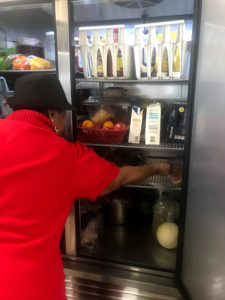
As the name suggests, the Culinary Arts Ministry is more than just a food and fellowship team. Under Mrs. Moore’s direction, this ministry is introducing the church and community to healthier ways to prepare and eat cuisine that they have enjoyed for generations.
Evelyn Moore has been a part of the Waco community for over seventy years and a part of Carver Park Baptist Church for over forty. After leaving Waco as a young adult, she returned with her husband to raise her children here. “When it came time to raise my children, my husband and I talked about it and we felt that Waco was a quiet, reasonably positioned place to raise children in,” she says.
Having been raised in church, Moore was no stranger to serving the community. As a young mother, she and other church members were involved with neighborhood improvements like advocating for paved streets, getting a local landfill closed, and school integration. Moore says, “Community situations have always been a part of what our life was…we were involved with everything political or that had to do with improving the community.”

In the Culinary Arts Ministry, Mrs. Moore and her team approach service with thoughtfulness and creativity. “We make sure that whenever we have a church function, we have a reasonably healthy meal,” she shared. This includes two Sunday breakfasts, a mid-morning snack for the children, bereavement meals, meetings, and other church events.
When asked how she classifies a meal as “reasonably healthy,” Mrs. Moore explained that the meal components consist of two to three vegetables, little to no fried foods, whole grains, and as many fresh greens and fruit as possible. She stated, “Whatever is in season and is reasonably priced is what we offer on the menu every Sunday.” She explained that improving your diet is all about making informed decisions about what ingredients, foods, and processes to substitute, for example baking instead of frying, having 2% rather than whole milk, and substituting agave for sugar.
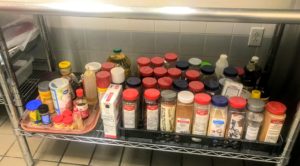
In the past, due to kitchen limitations, nutrition was sometimes compromised for time and ease of preparation. The church would often send out for fried chicken when there was an event. Moore says this was one of the first things they opted to change, “We wanted to get away from that fried chicken because fried chicken is…fried chicken! It’s saturated in fat, and it’s not always good for us.”
So, how has this nutritional shift been received by the church members? Evelyn says, “People who never ate carrots before, eat our carrots. People who never ate beets before, eat our beets…They’re learning how to prepare things they’ve never made before.” The key is creating familiarity for people who are afraid to branch out. To help create this, the Culinary Arts Ministry implemented a tasting day, “We have even done a heart healthy menu…We wanted to show people on that particular day that you could have tasty food, without it being bland and it can still be healthy.”
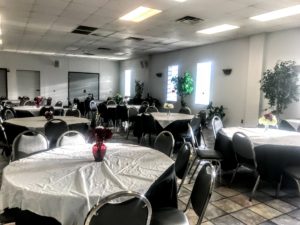
The Culinary Arts Ministry makes it a point to educate the rest of the church staff as well. Every third Sunday, they host a class where they discuss foods from the Bible, give hospitality training, and share tips about what to expect when hosting guests. More specifically, among Carver Park’s senior Bible study group, Moore is sharing more detailed information about health, nutrition, and exercise. “They’re lifestyle changes, not a diet. Our whole objective is to make us better, and to help others be made better by what we learn and do.”
For the community at large, Carver Park Baptist hosts an annual event titled, Feed My Sheep. Here, community members can join them for a healthy dinner and can receive food basket donations. Aside from this, people can come in to any service and eat there at any time.
The abundance of knowledge and resources within the Culinary Arts Ministry begs a pertinent question: Why doesn’t the community make healthier food choices? “I actually believe that people don’t eat healthy because of finances,” Moore shares. She began to reflect on previous attempts to connect the people in East Waco to healthy food. One of those early efforts was the “Veggie Van” organized by World Hunger Relief, Inc. As the name implies, the organizers would bring a van full of fresh vegetables to East Waco on a regular basis and offer them for sale. “I thought that the produce wagon that used to come through was pretty good,” Mrs. Moore says, “but they were a little bit expensive for the people in the neighborhood.” To remedy this, Moore has high hopes of rebuilding the church garden which would provide fresh produce to the community each week – with no obligation to turning a profit.
Another key ingredient Moore says is needed to help the community eat healthier is education – not only for nutrition, but for buying fresh with a low budget. “We need to get people educated on what they can eat without it being so expensive. Everybody says eating well is so much more expensive, but if [they] knew how to eat and how to prepare it [they] wouldn’t spend as much money.”
Moore is a strong believer in making a plan and sticking to it. Her advice to those who are new to or struggling with eating healthier? “Go to the market with your budget and your menu and have what you buy be geared to that. Work within those parameters. The next week do the same thing, and you’re going to learn that the food is much more tasty and makes you feel much better.”
Evelyn Moore continues to be a leading voice in improving the nutritional components of meals within her church and her community. However, she is just one of a team of individuals at Carver Park Baptist, and in East Waco, who are seeking to improve lives through better food. Another of these individuals is Helen Lewis, who manages Carver Park’s expansive food pantry. We will share that story in Part 2 of this series.

Khristian Howard is an Atlanta native and a recent graduate of Georgia State University where she earned a Bachelor’s Degree in Social Work. She has a passion for empowering communities through service, and seeks to connect advocacy to creativity. Currently, she is serving as the AmeriCorps VISTA for Texas Hunger Initiative Waco, where her work focuses on fostering collective impact to improve health and eating habits in East Waco. When she is not working, you may find her sharpening her culinary skills or exploring new poetic and artistic pathways.
The Act Locally Waco blog publishes posts with a connection to these aspirations for Waco. If you are interested in writing for the Act Locally Waco Blog, please email [email protected] for more information.
(Thanks to Beatriz S. Wharton, Senior Planner, Planning Services, City of Waco, for providing most of this information. – ABT)
By Ashley Bean Thornton
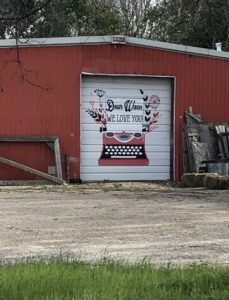
Waco Walks and the Centex Hispanic Chamber of Commerce are hosting a walk on LaSalle Avenue. We hope you will join us! We’ll meet up on Saturday, March 2, at 9:30 at the Centex Hispanic Chamber of Commerce offices at 915 LaSalle Aevenue. (Click here for the details.)
As usual, we will be sharing some history and telling some stories as we explore part of Waco on foot. As is often the case, we will also be learning a little bit about urban planning and, in particular, what “steps” (Get it?) we can take to help make Waco a more walkable community.
One of the tools a community can use to improve walkability is to create an “overlay district.” The term “overlay” or “overlay district” has been in the news quite a bit lately as the city and business owners consider the future of development on LaSalle Avenue. With that in mind, it seemed like a good time to learn a little bit more about the whole concept of overlay districts and in particular what is being proposed for LaSalle.
What is an “overlay district?”
An “overlay district” is a tool that a community can use to regulate development in a particular part of town or “zone.” Almost all land within Waco is “zoned” for a particular use. For example, some land is zoned for commercial use and some for residential use. Each zone has a particular set of rules that govern what may or may not be built in the zone as well as regulations and restrictions about design elements, for example, sidewalks, set-backs, parking, windows, landscaping, etc.
An overlay district is a set of rules that “overlays” the existing base zoning district in a particular area. It provides additional design regulations that address issues that are unique to a specific area. It can include increased regulations/ restrictions or relaxed restriction/ codes. Waco has five existing overlay districts: Brazos River Corridor District, Downtown District, West End District, Neighborhood Conservation District, and College and University Neighborhoods District.
Who can propose an overlay district?
Overlays in Waco have typically been proposed by the city, but can also be proposed by a group who is interested in implementing guidelines to protect or preserve a specific area’s characteristics and/or guide future development. The proposed LaSalle Avenue overlay, for example, has been more of a grassroots effort. A group of owners of property along La Salle Avenue organized public meetings and brought a proposal to the city.
Who makes the final decision as to whether an overlay district will be implemented?
Overlays are ordinance regulations and therefore must go through the public process. This means public hearings before Plan Commission and City Council (with two required readings). City Council makes the final decision. City Council can approve, disapprove, or approve an amended overlay. Notices are mailed to all property owners within the proposed overlay boundaries, as well as property owners within 200 feet of the proposed overlay boundaries, prior to public hearings.
What are some of the Pros and Cons of an overlay district?*

* Adapted from https://www.rcsanda.com/default.htm, downloaded 2/26/2019.
Highlights from LaSalle Avenue Proposal
(The full proposal can be found here: https://www.waco-texas.com/userfiles/cms-root/file/Planning/LaSalle%20Ave%20Overlay.pdf )
Purpose:
The purpose of the LaSalle Corridor District is to preserve and enhance a business district that is rich in heritage, historic architecture, business activity and significance as both a destination and a connector. It further aims to guide the LaSalle Corridor’s development into an area that serves: nearby neighborhoods and neighboring institutions; Waco residents and visitors; and vehicular and pedestrian travelers.
Application of Regulations:
Within the LaSalle Corridor district, the regulations of each respective base district shall continue to apply to property located in that district, except as expressly supplemented or modified herein. These regulations only apply to new development or a substantial renovation to an existing structure. Designated historical landmarks located in the LaSalle Corridor district may be exempt from section “Architectural Requirements”.
The following uses would be specifically prohibited in the LaSalle Corridor District:
- HUD-Code manufactured homes.
- Television and radio broadcasting towers.
- Automobile sale (except as incidental to primary use).
- Repair and servicing of automobiles and other passenger vehicles.
- Automobile car-washing establishments (unless screened and/or architecturally compatible with surroundings)
- Heavy machinery storage, rental, sales and repair.
- Machinery, farm sales, repairing and overhauling.
- Warehouse storage.
- Feed processing and grain elevators.
- Tire retreading, recapping or rebuilding.
- Motor freight and truck service terminals.
- Sand and gravel extraction except from the bed of the river.
- Junkyards, automobile-wrecking yards, salvage yards and scrap operations.
- Acid manufacturing.
- Cement, lime, gypsum or plaster of Paris manufacturing.
- Distillation of bones.
- Fat rendering.
- Fertilizer manufacturing.
- Gas manufacturing.
- Garbage, offal or dead animals, reduction or dumping.
- Glue manufacturing.
- Storage or refining of petroleum or its products.
- Smelting of tin, copper, zinc or iron ores.
- Stockyards or slaughter of animals.
- Agriculture feed lots.
- Asphalt batching.
- Screened or unscreened open storage.
- Sexually oriented businesses.
- Enclosed outside storage.
- Smoke shops
- Pawn Shops
- Payday Lending
- Well drilling shops.
Sidewalks
- All new developments and substantial renovations fronting on LaSalle must construct and maintain a 10-foot-wide pedestrian way along the pavement of the street.
- Fronting LaSalle, the pedestrian way must consist of a minimum 6-foot-wide sidewalk and a minimum 4-foot-planter strip between the sidewalk and street.
- Fronting other streets, the pedestrian way must consist of a minimum 5-foot-sidewalk and a minimum 4-foot-planter strip between the sidewalk and street.
- If the paved portion of the pedestrian way exceeds 8 feet in width then streetscape and landscaping must be incorporated into the design of the pedestrian way.
Want to learn more about LaSalle Avenue and how all this might look “in real life?” Join us for our walk! See you Saturday! Want to find our more about Waco Walks? Follow our Facebook page or join our email list.

This Act Locally Waco blog post is by Ashley Bean Thornton, she has lived in Waco almost 20 years now. Far longer than she ever lived anywhere else. She likes to walk. If you see her out walking, honk and wave and say, “Hi!”
The Act Locally Waco blog publishes posts with a connection to these aspirations for Waco. If you are interested in writing for the Act Locally Waco Blog, please email [email protected] for more information.
By Glenn Robinson
Cancer is now the leading cause of death in the United States and globally. Few among us have not already been touched by cancer in some way, whether it be ourselves, someone in our family or dear friends and colleagues. With that in mind, the following are a few notes on cancer care that will hopefully be helpful if cancer becomes a part of your life.
Cost
According to a study in The American Journal of Medicine, cancer forces 42 percent of patients to exhaust life savings in two years. It is expensive to treat, with patients facing potential surgeries, chemotherapy, and radiation treatments – in addition to expensive imaging tests. There are hospital stays, multiple doctor appointments each month, and many tests… not to mention the high cost of cancer-fighting medications, or income lost from missing work.
A recent study found that cancer patients, on average, are more than twice as likely to declare bankruptcy as those without cancer. Should you or a loved one face a cancer diagnosis, here are steps that may reduce some of the financial burden:
- Talk to your health insurance company and make sure you understand deductible and copay requirements.
- Take someone with you to doctors’ appointments who is not afraid to bring up the cost question on your behalf, if necessary.
- Tell care providers that cost is a potential issue.
- Discuss therapy options – and their cost – with your provider. Beyond choosing a lower cost therapy, avoiding low-value tests and procedures can save a lot of money.
- Consider hiring a financial counselor to help guide the family through this aspect of care.
Following these steps can help patients focus less on finances, and more on getting better.
Alternative Therapies
Nearly four in ten Americans believe that cancer can be cured solely through “alternative” therapies, such as oxygen therapy, diet, and herbs – according to a survey by the American Society of Clinical Oncology.
Many in the medical community were shocked by this finding and the danger it represents. A 2018 study underscores the danger, finding that patients with cancer using alternative medicine were more likely to decline potentially curative conventional cancer treatment, thereby increasing risk of death.
The National Institutes of Health has declared that no alternative health product or practice – such as acupuncture, chiropractic medicine and herbal medicine – has been proven to cure cancer. While these services may help patients manage cancer symptoms and side-effects from treatment, relieve stress, and improve quality of life, they are not a cure.
Patients facing cancer must keep in mind that delaying conventional cancer treatment can decrease the chances of remission or cure, and that using unproven products or practices to postpone or replace conventional medical treatment may be a costly mistake.
Even if they don’t delay conventional care, some alternative therapies may interfere with cancer treatments or be unsafe for cancer patients. Anyone diagnosed with cancer should consult their cancer care providers before using any alternative therapy for any purpose — regardless of whether it’s cancer-related.
Alternative therapies often do have a role in cancer care. As part of an ongoing discussion, patients and their physician can determine which therapies are safe and supported by evidence.
Advanced Treatment Options
For decades, when it comes to treating cancer, there have been three main options: surgery, radiation, or chemotherapy. Often these treatments are used in concert with one another to rid patients of tumors and eradicate any traces of the disease.
While these will likely remain staples of cancer care for the foreseeable future, a host of new advanced treatment modalities are coming online and are expected to expand the cancer care toolbox.
One is immunotherapy, which looks for ways to bolster the body’s immune system to prevent the spread of cancer. Some cancers take hold and spread throughout the body because they aren’t susceptible to the body’s immune response and even develop immunity to chemotherapy drugs and radiation. Immunotherapy attacks the cancer’s defenses, potentially allowing for effective treatment.
A related field of cancer study is therapeutic viruses and dendritic cell vaccines. These are biological agents, engineered in a lab, capable of seeking out and destroying cancer cells while leaving healthy tissue alone.
Another exciting development in cancer research involves nanoparticles. This advanced, microscopic technology can be used to more precisely target cancer cells in multiple ways without harming normal cells. For instance, nanoparticles can deliver heat to tumors to shrink them, or be loaded with medication and sent to hunt down cancer cells.
There may never be one silver bullet to cure cancer, but rapid progress on many fronts hopefully will someday lead to its demise.
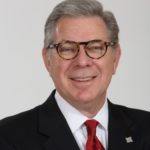
Glenn Robinson is the President of Baylor Scott & White Medical Center – Hillcrest. He has over 30 years experience in hospital and health care management, and currently serves on several Boards associated with the Texas Hospital Association and the American Hospital Association. In addition, Glenn is Past-Chair and an active member of the Greater Waco Chamber of Commerce, and serves on the Prosper Waco Board.
The Act Locally Waco blog publishes posts with a connection to these aspirations for Waco. If you are interested in writing for the Act Locally Waco Blog, please email [email protected] for more information.
League of Women Voters: Spread the word! Don’t let “Proof of Citizenship” letters discourage voting!
By Meg Wallace
The League of Women Voters of Texas (LWVTX) is spreading the word that naturalized citizens who properly registered to vote are indeed eligible to vote, in spite of what they may have heard in the news or received in their mailbox.
If you are a naturalized citizen who is registered to vote in Texas, you may have received a letter indicating that you must prove your citizenship in order to vote. Please do not let this letter discourage you from voting.
How did the letter come about?
In late January, Texas Secretary of State David Whitley created a list of names of people on the Texas voting rolls who may be noncitizens. Across the state, 95,000 people were on Whitley’s list. Of those, about 58,000 where shown to have voted at some point during the past 22 years.
Whitley sent this list to county elections officials and indicated they should send these registrants a “Proof of Citizenship” letter. The letter instructed the registrants that they have 30 days to prove their eligibility to vote, and that if they don’t prove their eligibility the county registrar will cancel their voter registration. Whitley circulated a media release about his actions late on a Friday afternoon.
This list received quite a bit of attention on social media and mainstream media. On the same Friday afternoon Secretary of State Whitley circulated his media release, Governor Greg Abbott and Lt. Governor Dan Patrick tweeted about “illegal voter registration,” and Attorney General Ken Paxton tweeted a warning of “VOTER FRAUD” in all caps. Soon after, President Donald Trump also tweeted about the assumed fraud.
Problems with the list
As it turns out, however, there are serious problems with the list. First of all, according to Cinde Weatherby, LWVTX Voting Rights/Election Law Issue Chair, “Many of the names represent noncitizens who applied for a driver license or State ID at the Texas Department of Public Safety during the past 22 years.” In the meantime, many of those individuals have become citizens. Each year from 52,000 to 63,000 Texans are naturalized in Texas. There are no requirements for them to notify the Department of Public Safety of that action.
“Proof of Citizenship” letters known to discourage voting
Challenge letters like the “Proof of Citizenship” letter described here have been shown to suppress voter participation. If someone is sent a letter and does not respond as instructed within the 30-day period provided, their registration can be canceled. This produces an additional burden on the voting rights of a specific group of registered voters: recently naturalized citizens. As a federal judge wroteregarding a similar recent attempted voter purge in Florida, “A state cannot properly impose burdensome demands in a discriminatory manner.” Furthermore, the text of the Proof of Citizenship letter suggested by the Texas Secretary of State does not indicate how registrants should supply their proof of citizenship to elections officials. This creates confusion, making it difficult for registrants who receive the letter to comply.
Upon hearing of the Secretary of State Whitley’s actions, Julieta Garibay, co-founder of United We Dream, contacted her county’s voter registrar office and received confirmation that she was on Whitley’s list. Originally from Mexico, Garibay moved to Austin in the 1990s and received a green card as a domestic violence survivor. She became a citizen in 2018 and voted for the first time in November. In her testimony at Whitley’s confirmation hearing before the Texas Senate Nominations Committee this month, she said, “As a Latina, as a woman, as a proud immigrant with an accent, I know my right, duty, and responsibility as a U.S. citizen, and I do not take it lightly. Winning my right to vote was not a victory just for me or my family. Rather, it was a victory for my community… I will not let these bullies intimidate me or prevent me from voting.”
How does this affect us in Waco?
Kathy Van Wolfe, McLennan County Elections Administrator, reports that her office did not send any Proof of Citizenship letters in response to Whitley’s instructions. Soon after she received the list, the Secretary of State’s office contacted her office to confirm all 388 people on the list sent to her had already been confirmed as citizens. At least five counties are known to have sent the letters. It is possible McLennan County voters may have family and friends who received them.
What should people do if they receive the letter?
LWVTX advises naturalized citizens who may receive the letter to “contact your county voter registrar to find out how to provide a copy of your naturalization certificate or U.S. Passport.” County voter registrar contact information is available on the LWVTX website’s naturalized citizen page.
“The League congratulates naturalized citizens participating as voters,” says LWVTX President Grace Chimene. “Every naturalized citizen, you have a right to vote and participate fully in our democracy.”
For more information about The League of Women Voters in Waco, please visit the Facebook page: League of Women Voters of Waco.

Meg Wallace is the organizer of the Amberley Collaborative a new nonprofit that is increasing the caring capacity of Waco and McLennan County by strengthening residents’ natural support systems.
The Act Locally Waco blog publishes posts with a connection to these aspirations for Waco. If you are interested in writing for the Act Locally Waco Blog, please email [email protected] for more information.
by Jaja Chen
On January 17, 2019 at Baylor University, we had the opportunity to hear Jemar Tisby (see news report) speak on fighting racism in our communities, cities, and congregations.
We can see through Waco history the impacts racism had on our city through the lynching of Jesse Washington in May 1916. Regardless of what one may think regarding Washington’s case, the fact that there was a lynching in downtown Waco with thousands of spectators should be enough to reveal the deep, pervasive, and horrific impacts that racism can have on people and our town.
While this blogpost is too limited of a space to expand on what Tisby shared regarding the history of racism and present realities of racism in the United States, I encourage you to follow-up with his newly released book The Color of Compromise and/or podcast series Pass the Mic to learn more.
Some practical application points that Tisby challenged us with include the A.R.C. response in the fight against racism. Awareness, Relationships, and Commitment (A.R.C) framed the latter part of his lecture and is a response to racism in our nation. Tisby defined racism as a “narrative of racial difference” – meaning the ongoing story and narrative in our culture and communities in which people are seen or treated differently as a result of the color of their skin. And in order to be anti-racist, Tisby called for intentionality amongst peoples to go against racist thought, responses, behaviors, and/or complacency.
Seeking to be anti-racist means having Awareness of the issues – learning about what racism is, how it impacts individuals and systems around us, and the impacts racial trauma has on people. Reading books can help you to learn more about racism and increase your perspective on the history of racial issues in America. Some books I often recommend include: The New Jim Crow by Michelle Alexander, Between the World and Me by Ta-Nehisi Coates, I’m Still Here by Austin Channing Brown, Prophetic Lament by Soong-Chan Rah, and Just Mercy by Bryan Stevenson. Documentaries like 13th on Netflix can also be informative.
Building Relationships with people requires us to step outside of our own spheres and to get to know people from backgrounds different than our own.
As you think of the friendships and relationships in your life, how diverse are they? Do you know and spend time with people from different racial/ethnic and/or cultural backgrounds?
Seeking to build bridges takes time and requires us to get out of our comfort zones. This can be a challenge for us as individuals and for organizations and businesses. At Waco Cha, we have strived to intentionally network and build relationships amongst individuals, businesses, and organizations with cultural backgrounds different than our own. Our lives are enriched when we have friends and community that value each other for who we are, the culture we are a part of, and the gifts and talents that we each bring to our Wacotown.
When it comes to engagement with people different from your culture, our local Community Race Relations Coalition hosts events and community gatherings throughout the year for members of the Greater Waco community. Visiting restaurants, stores, or churches different from your own racial or ethnic background can also help introduce you to new cultures. For business owners – consider joining the Cen-Tex African American Chamber of Commerce and Cen-Tex Hispanic Chamber of Commerce to build bridges and community amongst people of color whom you may not otherwise have connected with.
And lastly C for Commitment. This is often where we get stuck. We may be informed about racism and have friends of different cultures; however, in the end, if we do not seek to fight again social injustice in our own midst, the effects go only so far.
We need to have a commitment to fighting against injustices in our community. Engagement can include giving of our time or resources to supporting local non-profit and advocacy organizations. Advocacy organizations such as Waco Immigrants Alliance strive to advocate on behalf of immigrants, families, and those impacted by detention and mass incarceration in our community. Non-profits such as Greater Waco Legal Services and American Gateways strive to provide affordable legal services for individuals and families in our midst. And organizations such as Grassroots Community Development, formerly Waco Community Development, strive to cultivate healthy and diverse neighborhoods in Waco.
These are just a few of the many non-profit and advocacy organizations doing the work of justice daily in our town.
As I have challenged you all before – what is your response in being part of the change in our city? Is it to increase your awareness of racial issues? To begin or continue to build relationships with those whom are different from yourself? Or to commit to further or increased engagement against social injustices in our town?
May we each strive to be anti-racist Wacoans and to recognize that the fight against racism did not just begin or end with Martin Luther King, Jr. and the many courageous civil rights advocates that came before us. We each have a responsibility in building a better Waco.

Jaja Chen, LCSW, CDWF is a private practice therapist through Enrichment Training & Counseling Solutions specializing in PTSD, trauma, maternal mental health, and compassion fatigue. As an EMDR Trained Therapist, Jaja loves providing holistic trauma recovery to the Greater Waco community. Alongside her trauma therapy work, Jaja and her husband also run Waco Cha, an organic bubble milk tea stand, at the Waco Downtown Farmer’s Market. Jaja can be contacted via email at [email protected] or via webpage at http://enrichmenttcs.com/meet-jaja-chen/.
The Act Locally Waco blog publishes posts with a connection to these aspirations for Waco. If you are interested in writing for the Act Locally Waco Blog, please email [email protected]for more information.
By Jeremiah Banks
Matt, Marci, Trista, Donna, Kevin, Kayla – these are the names of people who came into my life and helped me learn about work. They pushed me to grow when I least expected it and needed it the most. As I stumbled (or more personally for me – overthought) my way through each job I’ve had, from bagging groceries at Albertson’s, to interning with my Youth Pastor, to working with neighborhood youth, and now as a school social worker here in Waco at Communities in Schools (CIS) of the Heart of Texas, these people walked alongside me and helped me in my journey into the sometimes weird and confusing world of work.
Here at the Workforce Development Program at CIS of the Heart of Texas, we talk a lot about the world of work. We serve young people from 16-24 years old. We meet them in school and out in the community looking for jobs, trying to get into college, going back to get a GED, and exploring careers. Our job through the Temporary Work Experience Program is to walk alongside them in their journey into the world of work.
Work plays a central role in each and every one of our lives. You can’t escape it. Think about it. What’s one of the first questions you ask someone new when you meet them? If you’re like most, “What do you do?” is one of the first questions off of your lips.
Yet, if I can be honest for a second, who hasn’t had a moment in life when that question caused anxiety – a point of transition in your life, a switch to a new job, or a time when you didn’t know what you were “doing?” It can make you feel a bit lost.
This is where we meet nearly every one of the young people in our Workforce Development Program — in transition. Imagine a young mother, balancing GED classes and a part-time job that is just enough to pay the bills, or a young man looking for a job while living with family after graduating high school. Each young person we meet is in transition, trying to “take that next step” or “get back on their feet.” They are not quite sure which way to turn, meanwhile the world continues to spin around them. In the midst of the uncertainty and the spinning, the one thing each and every one of them unflinchingly knows is that they need to find work. But there a plenty of things they don’t know: What do I want to do? What CAN I do? How do I find work? How do I keep at it even when I run into roadblocks? How do I succeed and move up and build a career? How do I even get started?
Relationships
I have found that in times of transition — where these young people find themselves — relationships make all the difference.
At CIS, we believe in the power of relationships. Through our Temporary Work Experience Program, CIS partners with local businesses/organizations to provide internships for young people. The interns work for up to 20 hours per week for 6-8 weeks. I am convinced that the internships that make the biggest difference are the ones where the young interns make a key relationship. They find their own “Matt” or “Donna,” a person who helps them develop good work habits and basic work skills, and beyond that, invests in them personally. In my own personal experiences and in my work with the Temporary Work Experience Program, I have learned that relationships help us grow in ways we never expected. They can help us understand ourselves. They can help us gain crucial insights into our skills, character, and interests. We gain opportunities to grow through the relationships we build. Relationships help us grow personally, help us overcome barriers, and help us enjoy our place in life while moving toward whatever is next.
The Temporary Work Experience program at Communities In Schools of the Heart of Texas is an opportunity for young adults ages 16-24 who are interested in increasing their job readiness skills. Participants work at a part-time internship with a local business or organization for up to 20 hours per week for 6-8 weeks. Participants are also matched with a Career Coach at Communities In Schools who will support them with through counseling about financial literacy, resume development, job search assistance, and more.
Are you interested in hosting an intern at your business or organization? The interns are paid through the work experience program, so the only cost to you is your investment of time and interest in the young participant. Who are the Matt’s and Marci’s in your life? Would you be willing to be a Trista or Kayla for a young person in transition?
Potential candidates for the internship program or local businesses/organizations who are interested in hosting an intern (for free!) are encouraged to contact Jeremiah Banks at [email protected] or by phone at 254-753-2006, ext. 2024 for more information on eligibility. The Workforce Development program at CIS is made possible through a partnership with the Heart of Texas Workforce Development Board.

Jeremiah Banks is a Workforce Coordinator at Communities in Schools of the Heart of Texas where he works alongside local business/organizations to build internships for In-School & Out-of-School Youth to help students explore careers, build job skills, and foster key relationships that will help them succeed in work and achieve in life. If you are interested in learning more about how to host an intern through the CIS Temporary Work Experience Program, you can contact Jeremiah at j[email protected] or 254-753-6002 ext. 2024.
The Act Locally Waco blog publishes posts with a connection to these aspirations for Waco. If you are interested in writing for the Act Locally Waco Blog, please email [email protected] for more information.
